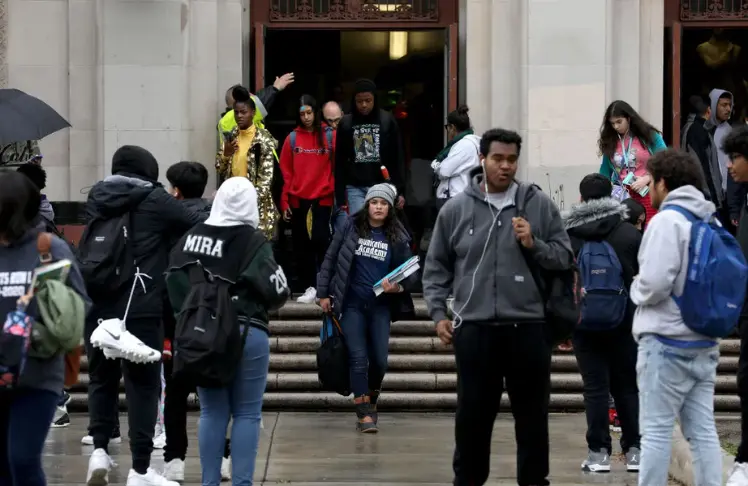
by Aziah Siid
Banning books written by Black authors, issuing permission slips to hear a book by a Black author, blocking the AP African American Studies curriculum — those are just some of the ways anti-Blackness has been showed up recently in the nation’s public schools.
Now, a new report from the Pew Research Center reveals what teens, parents, and educators think about how race is handled on K-12 campuses, as well as two other hot-button issues: sexual orientation and gender identity.
For the report, Pew’s researchers analyzed responses to three recent surveys. The first was an online survey taken last fall by 2,531 K-12 public school teachers. A second survey last fall collected responses from teens ages 13 to 17, and a third surveyed parents in 2022,
“One thing we found in this study is that, while race and LGBTQ issues are often lumped together in discussions about the so-called culture wars in K-12 education, teachers, teens, and the public see these topics differently,” Luona Lin, a research associate at Pew tells Word In Black.
But at a time when presidential candidate Nikki Haley has drawn criticism for stating the Civil War began because of “freedoms,” and textbooks have included that Black people benefitted from enslavement, how slavery is taught takes center stage.
Student Comfort With Learning About Slavery
First off, how comfortable are teens learning about slavery? Pew found that 38% of students overall said they’re comfortable when “topics related to racism or racial inequality have come up in their classes,” and 21% aren’t.
What may surprise some is that 33% of Black students said they’re uncomfortable when race or racial inequality comes up in class, significantly more than the 19% of white and 17% of Hispanic teens.
When it comes to teaching accurate American history, more teens — 48% — responded that when they’re learning about slavery, they’d also like to learn how “it still affects the position of Black people in American society today.”
However, 40% of teens say they’d like to learn “that slavery is part of American history but no longer affects the position of Black people in American society today.”
In addition, 11% of teens said the topic shouldn’t be taught in schools at all.
When the responses of Black students were examined, Pew found the majority of Black teens — 79% — said they would prefer “would prefer to learn that the legacy of slavery still affects Black people today.” Only 41% of white and 45% of Hispanic teens agree.
Teacher Attitudes About Teaching Slavery
The majority of K-12 teachers surveyed — 64% — said students should learn the legacy of slavery still has an impact on the lives of Black Americans. Another 23% of teachers acknowledge slavery as a historical fact that students should learn about, but they argue it’s history that no longer affects Black Americans’ standing.
Then, there are the 8% of teachers who responded that this crucial part of history should be swept under the classroom rug and not taught in school at all.
The survey also asked teachers if culture war debates about how public schools should teach about race impact their ability to do their jobs.
41% of K-12 teachers said these debates have hurt their ability to do their job, while 53% said the impact has been neither positive nor negative — or that these debates have had no impact. Just 4% said these debates have a positive impact.
Parent Influence
Thanks to Florida Governor Ron DeSantis’ “Stop W.O.K.E.” campaign, parents have been empowered to get books and films stripped from classrooms and schools — putting them in the driver’s seat regarding what’s taught to students.
25% of teachers said parents should be able to opt their child out of discussions ‘related to racism or racial inequality.’
“We do not offer specific policy recommendations, but what we do see in the data is that most teachers say teachers themselves don’t have enough influence over what’s taught in public schools in their area,” Lin says. “A majority of teachers also say their state government has too much influence, and more say the federal government, the local school board, and parents have too much influence than say.”
According to the survey, 25% of teachers said parents should be able to opt their child out of discussions “related to racism or racial inequality.”
At the same time, “Teachers and Americans overall are more likely to say parents should be able to opt their children out of learning about LGBTQ issues than to say the same about race,” Lin explains.
Nearly half of the educators out there, about 48%, are giving the thumbs up to parents being able to opt their children out of instruction on sexual orientation or gender identity in their classrooms, “if the way they are taught conflicts with parents’ personal views or beliefs.”
How did students respond? “A larger share of teens say they feel comfortable when topics related to race come up in class than say the same about topics related to sexual orientation or gender identity,” Lin says.
The research didn’t dig deep into the intersectionality of race and LGBTQ issues, but Lin says it certainly remains an important topic for future research in K-12 education.















